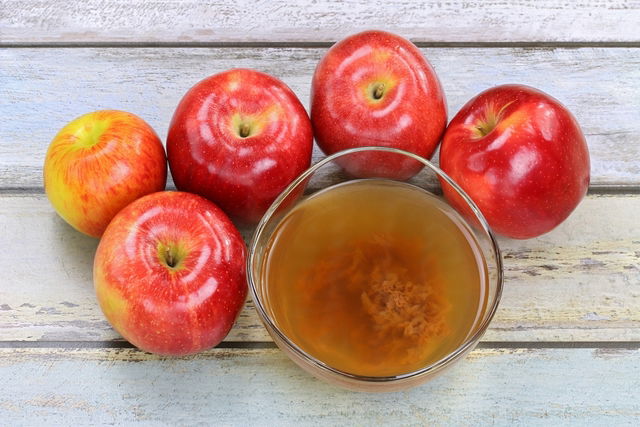Apple cider vinegar is a fermented food that has potent antioxidant, anti-inflammatory, and anti-microbial properties. It can be used to treat acne, prevent heart disease and delay premature aging.
In addition, apple cider vinegar consists of pectin, a soluble fiber that decreases the absorption of carbohydrates in the intestines, which helps control spikes in blood sugar. This makes apple cider vinegar a useful tool for weight loss and managing diabetes.
This type of vinegar can be prepared at home or purchased at supermarkets. It can be easily incorporated into your day-to-day diet.

Health benefits
The main benefits of using apple cider vinegar include:
1. Helping with weight loss
Apple cider vinegar contains many amino acids and polyphenol compounds that reduce the absorption of carbohydrates in the intestines. Because it is rich in pectin, a soluble fiber, it can help to give you full sensation that reduces hunger.
Apple cider vinegar also has anti-inflammatory and anti-oxidant properties, which prevents fat storage.
2. Treating reflux
Even though it is an acidic food, apple cider vinegar helps regulate pH within the stomach, which helps to prevent reflux symptoms such as heartburn and bloating.
3. Helping control diabetes
Some studies have shown that apple cider vinegar can help with the management of diabetes. It contains fibers that reduce the absorption of carbohydrates during digestion, which help to control spikes in blood sugar after meals.
In addition, some studies have reported that apple cider vinegar can also help boost insulin action and reduce the production of glucose in the liver, which also contribute to the management of diabetes. For apple cider vinegar to have that effect, however, it needs to be part of a healthy, balanced diet, and medical treatment needs to be continued.
4. Improving digestion
Apple cider vinegar is rich in fibers and acids, such as acetic acid and chlorogenic acid, which can significantly aid with digestion. Apple cider vinegar can be used to help relieve digestive problems, protect the stomach, improve digestion and decrease bloating after eating.
5. Protecting against cardiovascular diseases
Due to its anti-oxidant and anti-inflammatory properties, apple cider vinegar is capable of preventing fat from depositing along arterial walls. Therefore it can help reduce the risk of cardiovascular diseases, such as atherosclerosis.
In addition, apple cider vinegar can also help reduce bad cholesterol (LDL) and triglycerides, as well as control blood pressure, which reduces the risk of having a stroke and a heart attack.
6. Protecting the liver
Apple cider vinegar is rich in a veriety of acids, including gallic, lactic, malic, and citric acid. These act directly on the liver to improve its function. These acids also help to reduce fat storage in the liver, and consequently, prevent the development of fatty liver disease.
7. Preventing yeast and bacterial infections
Some scientific studies show that apple cider vinegar has antimicrobial properties capable of decreasing the overgrowth of some microorganisms that are naturally present in the body, such as Candida albicans, E. coli or Staphylococcus aureus. These fungal cells and bacteria can over-grow and cause infection, like urinary tract infections, gastrointestinal infections, and skin infections.
8. Delay aging
The polyphenols present in apple cider vinegar have potent antioxidant properties that help fight free radicals, improving skin quality and slowing down aging.
9. Treating acne
Apple cider vinegar is composed of acids, such as acetic, citric, lactic, and succinic, which have an antimicrobial effect against Cutibacterium acnes, the bacteria that is responsible for causing skin acne.
However, as it has a lot of acids, apple cider vinegar should not be applied directly to the skin as it can cause burning. The best way to use it topically is to make a solution with one tablespoon of vinegar to one cup of water. If you apply this apple cider vinegar solution to your face and you feel it burning, rinse it off immediately and refrain from using again. This solution is also not appropriate for sensitive skin or for open wounds or sores.
How to use apple cider vinegar
Some ways to reap the benefits of apple cider vinegar are:
- Drinking an apple cider vinegar solution: you can dilute one to two tablespoons of apple cider vinegar in a glass of water and drink it 20 minutes before breakfast, lunch, or dinner. It's important that you rinse your mouth with water after drinking and to brush your teeth 30 minutes after drinking the apple cider solution to prevent tooth enamel erosion,
- Adding it to your diet: you can easily add apple cider vinegar directly to your raw foods or salads;
- Topical application: you will need to dilute one tablespoon of apple cider vinegar in a glass of water, and then dip a cotton pad into this solution and dab it on your skin. You skin should be clean and dry prior to application. Leave the solution on your skin for five to twenty seconds and then wash your face again to heal inflamed acne and clear your pores. After cleaning your skin, pat it dry with a clean towel, apply a moisturizer with SPF and avoid sun exposure.
It's important to emphasize that in order to reap its benefits, apple cider vinegar must be part of a balanced and healthy diet.
How to make apple cider vinegar at home

Apple cider vinegar must be made only with apples and a little water so that it's as natural as possible.
It is recommended that you use two big apples, which you should wash, peel, and core. Dice the apple into small chunks, and then:
- Place the apple chunks in a blender and add some water. The amount of water depends on the quantity of apple you use, but it is normally recommended that you add water until at least half of the apple chunks are covered;
- Turn the blender onto high speed, and continue until the apples are completely pureed;
- Pour this mixture into a glass bottle, put a lid on and store it away from sunlight, at room temperature for 4 to 6 weeks. It's important to fill the bottle only until halfway for fermentation process to happen properly;
- After this time, place the mixture in a large recipient like a glass dish without a lid, cover with a clean cloth and leave in the sun for about three days.
After being in the sun for three days, the apple cider vinegar must be filtered and then placed in a dark bottle, before it can be used.
Possible side effects
When consumed in large amounts, and for a long period of time, apple cider vinegar can cause side effects such as nausea and vomiting, throat ache, digestion problems, decrease of potassium in the blood, loss of bone mass, and osteoporosis, as well as damaging to the tooth enamel.
Who should avoid using apple cider vinegar
Apple cider vinegar must not be consumed by those who have apple cider vinegar allergies nor by people who are taking medication like digoxin, or diuretics such as furosemide or hydrochlorothiazide. Diuretic, when taken with apple cider vinegar, can reduce potassium levels in the blood and cause muscle weakness, cramps, paralysis, or arrhythmias.
